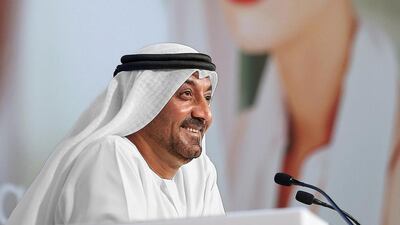Currency fluctuations, security and protectionism will be Emirates’ biggest challenges this year after the Dubai flag carrier posted a 40 per cent rise in annual net profit.
Emirates reported a net profit of Dh4.6 billion for the financial year ended March 31, helped by a drop in oil prices in the second half of the year.
Emirates said that the decline in oil prices provided savings of Dh2bn. While fuel still remains its biggest expense, the airline said it now constitutes about 35 per cent of its operating cost, down from 39 per cent a year earlier.
“Looking ahead, the ongoing uncertainty for many currencies and economic markets around the world will continue to pose a challenge, as well as the looming protectionism in some countries,” said Sheikh Ahmed bin Saeed Al Maktoum, the chairman and chief executive of Emirates.
Sheikh Ahmed’s remarks on protectionism come as American airlines and their unions try to limit the activities of Gulf airlines in the US, with tensions between the two having escalated in recent months.
In January, a US industry group including Delta, United and American Airlines released a 55-page document detailing allegations of unfair government subsidies to Arabian Gulf carriers and other financial incentives that they claim were in breach of the open skies agreement between the two countries.
The US coalition is asking the government of the president, Barack Obama, to start consultations with Gulf countries over fair competition in relation to the open skies treaty.
Emirates has categorically denied such claims and said it would respond to the allegations.
Last year Emirates lost Dh1.7bn in revenue because of the 80-day period of runway repairs at Dubai International Airport. However, the airline reported its second-best results in its history, after the 2010-11 financial year. The carrier’s revenue was up 7 per cent at Dh88.8bn.
Last year Emirates had to scale back its operation in conflict zones such as Iraq, Libya, Syria, and Yemen. The Ebola outbreak in Africa also took its toll on Emirates, leading it to suspend some of its operations in Africa.
“The shooting at a flydubai 737 in Baghdad prompted airlines to cancel flights immediately – it will be these sorts of short-term events and changes that will cause operational changes to have a financial impact, much in the way that the Ebola outbreak in West Africa impeded demand too,” said Saj Ahmad, the chief analyst at StrategicAero Research.
However, the airline managed to carry 49.3 million passengers during the year, up 11 per cent from a year earlier.
Emirates, the world’s biggest operator of the A380 superjumbo aircraft, said that it grew its fleet by 14 jets last year to 231 aircraft.
selgazzar@thenational.ae

